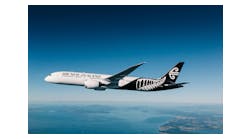Feb. 27--Ambiguity in the federal tax code is costing some owners of Alaska flight services their businesses, according to members of the Alaska Air Carriers Association.
Joy Journeay, executive director of the association, said that the Internal Revenue Service has audited six air carriers in the state since 2010 for their application of excise taxes imposed on regular service. Of those audited, three businesses have been sold or gone out of business, she said, and two more are currently being investigated by the IRS.
Why the audits started suddenly is unclear, she said, as many of the businesses had been operating under similar procedures for decades.
Some of the tax "bills" handed down by the IRS for failure to properly apply the excise tax have approached $2 million dollars, Journeay said in an interview. She declined to comment on how many carriers reached settlements or were issued court orders to pay.
The husband and wife team of Todd and Suzanne Rust are waiting to hear from the IRS after being audited. Along with Colin Rust, the couple owns Rust's Flying Service in Anchorage and K2 Aviation, which operates flightseeing tours of the Alaska Range out of Talkeetna. Combined, they fly 20 single-engine aircraft and employ about 75 people. They told their story during a Feb. 19 panel discussion at the Air Carriers convention -- something other operators have been hesitant to do for fear of drawing attention to themselves.
Todd Rust said he wasn't willing to share what the Rusts expected their tax liability would be, but he did say in an interview that charges totaling several hundred thousand dollars have been common.
Scott Harris, owner of Harris Aircraft Services in Sitka, told the Journal that a 2011 audit ultimately cost his business $250,000. At the time of the audit, Harris Air flew four aircraft offering service to area lodges as well as supporting Interior Department operations, he said.
After laying out his situation to his bank, Harris said he was able to get an unsecured loan to cover his tax liability.
Typically, a $4 excise segment tax is applied for each leg of a flight, along with a 7.5 percent tax on the charged fare on a scheduled flight.
An IRS instructional document for tax Form 720, which must be submitted quarterly for excise and fuel taxes, provides an example of excise tax application: "In January 2014, Frank Jones pays $266 to a commercial airline for a flight in January from Washington to Chicago with a stopover in Cleveland. The flight has two segments. The price includes the $240 fare and the $26 excise tax for which Frank is liable. The airline collects the tax from Frank and submits it to the government."
It further states that if a segment is to or from a rural airport, the segment tax does not apply.
Confusion has arisen among flight service operators about how the tax applies to flightseeing tours, bear viewing flights and flights chartered for hunting and fishing trips. An internal IRS memo from July 2012 directed to Excise Tax Program Chief Holly L. McCann attempt to describe six Alaska-specific scenarios exempt from excise taxes.
A "bear viewing platform day tour" to which the tax does not apply is described as, "After landing, the customer deplanes and walks a short distance to a platform where the customer views wild bears. While on the ground, the customer may have a box lunch, but does not engage in any other activities (such as fishing or kayaking). After a few hours, the customer re-boards the aircraft (which may or may not wait on site) and returns to (the operator's) home base. The bear viewing platform day tour begins and ends on the same calendar day."
Another memo to McCann dated October 2012 states that seaplane operations are exempt from excise taxes if the areas at which takeoff and landing occur have not received funds from the Federal Aviation Administration's Airport and Airways Trust Fund.
Both memos state, however, that, "This advice may not be used or cited as precedent."
Journeay told the gathered AACA members that the disclaimers on the memos exemplify the variance with which IRS employees apply the tax.
Harris said that while "ignorance is no excuse" when it comes tax law, the nature with which rules regarding regular and scheduled flight lines were applied, are particularly troubling to him.
Because regular service is taxable, it is up to the auditors to determine if -- by looking at historical records -- shuttle flights to lodges and similar frequent but not formally scheduled service should be taxed, he said.
"Running float planes to a lodge somewhere -- I don't think that was the spirit" of the tax code, Harris said.
Further, he said he is hesitant to apply the tax to all flights to protect his business from liability because the added charge could be a competitive disadvantage against other flight services not adding the tax to their rates.
Requests for comments to questions submitted by the Journal to the regional IRS office in Seattle were not returned in time for inclusion in this story.
"When we talked to the IRS lawyer about (how the tax is applied) he said, 'It's semantics," Journeay said. "'If a person uses certain words when describing what they're doing they're going to be liable for the law and if someone else uses different language they won't be.'"
She added that if the IRS cannot decide how to apply the tax, the operators should not be penalized.
Flights conducted with small aircraft -- designated by the IRS as those less than 6,000 pounds gross weight -- are also exempt from the excise tax. That varies from the FAA, which defines a small airplane as less than 12,500 pounds maximum gross weight.
Flights deemed exempt from excise taxes are subject to a 19-cent per gallon tax on fuel burned during the flight -- one or the other is paid. Journeay said operators need to know which tax to apply or they could face other penalties.
Additionally, she said if the excise tax is applied retroactively out of the operator's pocket in an effort to comply, the IRS could levy a $250 fine per violation for not following correct procedure.
Air audits
IRS officials first approached the Rusts about an audit in the summer of 2011. Suzanne Rust said the auditors respected their request to delay the action until the end of the busy flying season, and they began a review of flight records that fall, she said.
The audit required devoting "a couple of employees for three weeks" to compile data requested by the IRS, Todd Rust said.
Flight schedules are kept at the Rusts' businesses for a year, he said. The IRS used those to extrapolate operations out for three years he said, putting their "accuracy in question."
Suzanne Rust wondered about the tactics used by the auditors during their work, as well. She said the attorney the Rusts hired questioned the necessity of some of the documents the auditors requested and was told the audit would simply be pushed out to seven years from the original three.
Harris, of Sitka, said the auditor assigned to his case was helpful and understanding. It was in a conference call with the auditor's supervisor that he was told his audit would also be expanded from three years to seven if he appealed the liability ruling.
Todd Rust said he did not get an answer when he asked IRS officials how audited businesses are chosen.
Journeay said the association has asked Alaska's congressional delegation to push for an end to the audits until the application of the tax code is easily understood and for the use of terminology that is consistent with the FAA.
In a Jan. 22 letter to the delegation, the Alaska Air Carriers Association also asked for forgiveness of "current punitive audit findings and protection from punitive actions" until the confusion is resolved.
"One of the worries that we have is that if this type of auditing for small carriers in the state of Alaska goes unchallenged all of the fishing guides and hunting guides who carries anyone and sells a package to go hunting for $4,000 -- the IRS can come in and say $2,000 of that was for the plane that took you out and you should've been collecting taxes," Journeay said to the AACA membership. "We're just seeing that as a very ripe fruit that could be picked."
Delegation intervention
Matthew Shuckerow, a spokesman for Rep. Don Young's office, wrote in an email to the Journal that the congressman introduced legislation to amend IRS code for "on-demand" flights in July 2012. The bill would have clarified when rural charter flights should receive excise exemptions, Shuckerow wrote.
A Sept. 13, 2013, letter addressed to Treasury Secretary Jacob Lew and then-acting IRS Commissioner Daniel Werfel signed by Young and Sens. Lisa Murkowski and Mark Begich says that the some of audited businesses have operated under the assumption they were exempt from excise taxes for decades.
The letter also requests a meeting with Werfel to discuss the justification for continuing the allegedly "extraordinarily onerous and punitive" audits without providing clarification to the tax code. The congressional delegation also questioned the conduct of IRS staff.
"In at least one instance, our offices were informed that the IRS began an audit in the summer of one year, left, did not return to complete the audit until the next summer and then assessed the taxpayer penalties and interest for the intervening months while the agent was away. These actions are very burdensome on small business," the letter states.
Another letter from the delegation dated Feb. 6, 2014, this time addressed to Lew and current IRS Commissioner John Koskinen, stated a promise made by Werfel for a response on the tax issue by the end of January 2014 was not kept and demands the audits be suspended.
"The Internal Revenue Service is dragging its feet on what should be a simple policy clarification and as a result, Alaska air carriers are faced with an uncertain future. Sen. (Lisa) Murkowski and Rep. Young and I agree -- it's time to change the language and make the tax policy work for these Alaska businesses," Begich said in a statement from his office.
Todd Rust said a year went by between the time the audit was finished and when an administrative appeal was held last September. After flying to San Francisco with their attorney, the Rusts were told they had no grounds for an appeal because IRS attorneys had already reviewed the case, Suzanne Rust said.
"The clock kept ticking on the interest that whole time," she added.
Journeay and Suzanne Rust both advised flight service owners to contact legal counsel so operation in "good faith" can be verified and penalties on top of late payments and interest can be avoided in the event of an audit.
As to whether or not the Rusts will take their companies' tax liabilities to court when they arrive in the mail, Suzanne Rust said the decision will have to be made if it is worth investing the $50,000 she said it would take to start in court against the IRS.
"I don't know how many operators have $50,000 just to gamble with," she said.
Elwood Brehmer can be reached at [email protected].
Add your comment:
--Log In
--Sign Up
Login
Create an instant account, or please log in if you have an account.
Email address (not displayed publicly)
Password
Forgot your password?
Create an account
Create an instant account, or please log in if you have an account.
Copyright 2014 - Alaska Journal of Commerce, Anchorage




